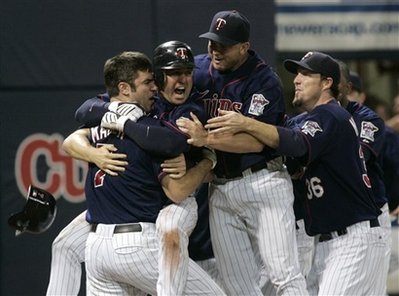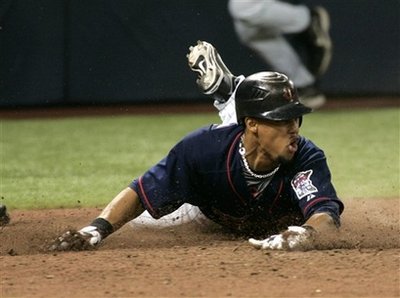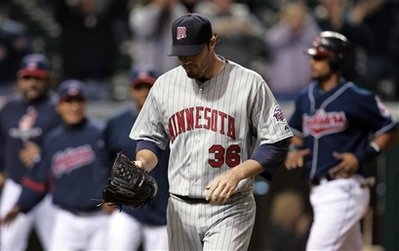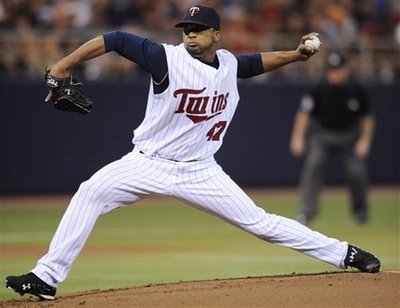October 1, 2008
The Successful Disappointment
The thing that I tell you now
It may not go over well
It may not be photo-op
In the way that I spell it outBut you won't hear from the messenger
Don't wanna know 'bout some thing that you don't understand
You got no fear of the underdog
That's why you will not survive
Losing 1-0 on the road in a one-game playoff is an awfully tough way for things to end and leaves me sort of shell-shocked when it comes to looking back at the Twins' season. For the most part fans seem to fall into two categories regarding the Twins this year, either viewing their 88-win, second-place finish as gravy because of low expectations or seeing their late-season collapse as a disappointing failure to take advantage of an unexpectedly weak division. For me, their season falls somewhere in between.- Spoon, "The Underdog"
It's true that expectations for the Twins this season were lower than they've been at any point since Ron Gardenhire took over as manager. In fact, my March 31 entry noted that "for the first time in the nearly six-year history of this blog Opening Day has arrived without the Twins being viewed as serious playoff contenders." In that sense they certainly out-performed expectations, spending all season as "serious playoff contenders" and ultimately coming up one game short of their fifth division title in seven years.
 On the other hand, the now oft-repeated notion that no one could have possibly expected the Twins to play as well as they did is an exaggeration to say the least. Sure, my prediction that they'd finish in third place proved to be wrong, but that has more to do with the rest of the division under-performing than it does anything else. My guess was that the Twins would win 83-85 games this season and they ended up winning 88, which is hardly shattering expectations.
On the other hand, the now oft-repeated notion that no one could have possibly expected the Twins to play as well as they did is an exaggeration to say the least. Sure, my prediction that they'd finish in third place proved to be wrong, but that has more to do with the rest of the division under-performing than it does anything else. My guess was that the Twins would win 83-85 games this season and they ended up winning 88, which is hardly shattering expectations.
Instead, 88 wins (or even 83-85 wins) proved to be better than anticipated compared to the rest of the division because both the Indians and Tigers failed to emerge as elite teams. Coming into the season it looked to me at least like winning 83 or 85 or 88 games would be good for third place, because the Indians and Tigers would likely win 90-plus. In reality 83 or 85 or 88 wins led to a near first-place finish and season-long stay in playoff contention because the rest of the division under-performed.
 In other words, while the Twins absolutely out-performed preseason expectations they hardly shattered them to the degree that many fans suddenly seem to believe, and if the Indians and Tigers hadn't fallen apart the Twins winning 88 games would be viewed much differently. Context is everything. All of which is why their season ultimately strikes me as both successful and disappointing, which is admittedly an odd combination. Of course, it was an odd season.
In other words, while the Twins absolutely out-performed preseason expectations they hardly shattered them to the degree that many fans suddenly seem to believe, and if the Indians and Tigers hadn't fallen apart the Twins winning 88 games would be viewed much differently. Context is everything. All of which is why their season ultimately strikes me as both successful and disappointing, which is admittedly an odd combination. Of course, it was an odd season.
Winning 88 games and finishing nine agonizing innings away from another division title is clearly a more successful season than anyone should have realistically expected. However, a big part of why winning 88 games put the Twins in position to contend all season is that the rest of the division was dramatically weaker than most people expected. Because of that there's a lot of disappointment mixed in with the success.
 By not addressing the bullpen's problems and stumbling to a 14-21 record down the stretch the Twins failed to take advantage of a surprising opportunity to win the weaker-than-expected division. Sure, they won slightly more games than my prediction and a dozen more games than many people expected, and it's understandable that those same people view 88 wins and contending until the very end as successful, period. Part of me definitely agrees with that.
By not addressing the bullpen's problems and stumbling to a 14-21 record down the stretch the Twins failed to take advantage of a surprising opportunity to win the weaker-than-expected division. Sure, they won slightly more games than my prediction and a dozen more games than many people expected, and it's understandable that those same people view 88 wins and contending until the very end as successful, period. Part of me definitely agrees with that.
At the same time the front office followed a poor winter by refusing to address an in-season weakness that consistently led to losses, and the team limped to the finish line by repeatedly blowing chances to emerge atop a division that was there for the taking. Should that be overlooked because they won 88 games and the division struggled? Perhaps, but that's a tough sell for me after watching things unfold. Successful doesn't preclude disappointing, just as disappointment doesn't take away from success.
 The season included many memorable wins, outstanding performances from Joe Mauer, Joe Nathan, Scott Baker, Justin Morneau, and Jason Kubel, an encouraging comeback from Francisco Liriano, the emergence of Denard Span and Kevin Slowey, and clear signs of promise from Alexi Casilla, Glen Perkins, Nick Blackburn, Jose Mijares, Carlos Gomez, Delmon Young, Brian Buscher, Matt Tolbert, and Craig Breslow.
The season included many memorable wins, outstanding performances from Joe Mauer, Joe Nathan, Scott Baker, Justin Morneau, and Jason Kubel, an encouraging comeback from Francisco Liriano, the emergence of Denard Span and Kevin Slowey, and clear signs of promise from Alexi Casilla, Glen Perkins, Nick Blackburn, Jose Mijares, Carlos Gomez, Delmon Young, Brian Buscher, Matt Tolbert, and Craig Breslow.
The season included many crushing losses, regrettable acquisitions Livan Hernandez, Craig Monroe, Mike Lamb, and Adam Everett, unfortunate departures from Johan Santana, Matt Garza, Torii Hunter, and Jason Bartlett, forgettable performances from Matt Guerrier, Boof Bonser, Brian Bass, and Juan Rincon, underwhelming debuts from Gomez, Young, and general manager Bill Smith, and injuries to Michael Cuddyer and Pat Neshek.
The season was simultaneously successful and disappointing, which is a combination that made the 163-game marathon such an interesting roller-coaster ride and what leaves me struggling to stomach how the whole thing ended. The promise of a significantly improved division in 2009 also makes me wonder what the offseason holds for a GM who struggled in his first year on the job and a young team that exceeded expectations before crumbling under the pressure of an unexpected pennant race.
Five months until pitchers and catchers report for spring training.
Once you're done here, check out my latest "Daily Dose" column over at Rotoworld.

